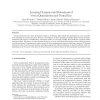Free Online Productivity Tools
i2Speak
i2Symbol
i2OCR
iTex2Img
iWeb2Print
iWeb2Shot
i2Type
iPdf2Split
iPdf2Merge
i2Bopomofo
i2Arabic
i2Style
i2Image
i2PDF
iLatex2Rtf
Sci2ools
121
click to vote
IJON
2008
2008
Learning dynamics and robustness of vector quantization and neural gas
Various alternatives have been developed to improve the Winner-Takes-All (WTA) mechanism in vector quantization, including the Neural Gas (NG). However, the behavior of these algorithms including their learning dynamics, robustness with respect to initialization, asymptotic results, etc. has only partially been studied in a rigorous mathematical analysis. The theory of on-line learning allows for an exact mathematical description of the training dynamics in model situations. We demonstrate using a system of three competing prototypes trained from a mixture of Gaussian clusters that the Neural Gas can improve convergence speed and achieves robustness to initial conditions. However, depending on the structure of the data, the Neural Gas does not always obtain the best asymptotic quantization error. Key words: Vector quantization, Clustering, Online learning, Winner-Takes-All algorithms, Neural Gas
Related Content
| Added | 12 Dec 2010 |
| Updated | 12 Dec 2010 |
| Type | Journal |
| Year | 2008 |
| Where | IJON |
| Authors | Aree Witoelar, Michael Biehl, Anarta Ghosh, Barbara Hammer |
Comments (0)

